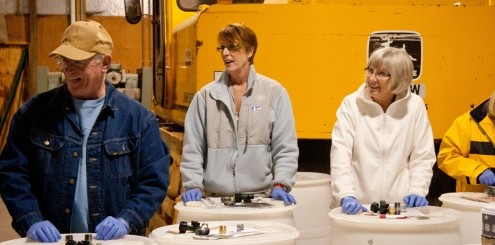Recent Poll on Carbon Fee Suggests Shift Toward Public Acceptance
Ann Arbor, MI – A recent study indicates an increase in public support for carbon tax proposals when the proposed use of the tax revenues goes toward renewable energy programs and consumer rebates.
A survey conducted by the Center for Local, State, and Urban Policy at the Gerald R. Ford
School of Public Policy at the University of Michigan and the Muhlenberg Institute of Public Opinion at Muhlenberg College, measured the degree of support for “a policy to reduce greenhouse gases by taxing carbon-based fuels such as coal, oil, and natural gas at the federal level,” based on the following scenarios presented to the survey participants:
- a carbon tax with no specified use for the tax revenue
- a carbon tax in spite of an increase in energy costs
- a carbon tax where revenue returned to public via tax rebate checks
- a carbon where the revenue is for research and development for renewable energy programs
Respondents were asked to indicate their political preference. Of those who participated, 259 indicated they were Democrats, 221 Republicans, 217 Independents, and 101 who indicated themselves as ‘other.’
When a carbon tax was proposed with no specified use for the tax revenue, only 34% of respondents supported it. Support for a carbon tax decreased when the survey suggested that a carbon tax would increase the cost of energy for the consumer, dropping down to 29% supporting a carbon tax.
But when a ‘revenue neutral’ plan (in which all of the tax revenues are returned to the public) was proposed, support went up significantly. When the survey suggested that consumers receive a rebate check, overall support rose to 56% with the most significant gain among respondents who indicated they identify most as being Republican, going from 15% where no specific use was suggested to 43% support when tied to a rebate check.
In addition to looking at rebate checks, the survey wanted to see how people felt about other uses for the revenues raised from a carbon tax. Putting the money toward research and development for renewable energy programs was the most popular carbon tax proposal on the survey, with 60% overall support.
Various models involving a carbon tax have been proposed in an effort to use a market-based approach to incentivize the reduction of CO2 emissions, a major source of global warming leading to climate disruption.
One model known as ‘cap and trade,’ according to the EPA, places a mandatory cap on emissions while providing sources flexibility in how energy producers comply. Cap and trade turns CO2 emissions into a commodity and only ensures that overall emissions within the specified energy market would be reduced down to the level of the cap, although a common criticism of cap and trade is in the ability to enforce it.
The question in the survey regarding support for carbon tax revenues to go toward renewable energy presented an existing cap and trade program – the Regional Greenhouse Gas Initiative involving nine Northeastern U. S. states. The initiative uses auction revenues for carbon allowances under its cap-and-trade program to fund renewable energy and energy efficiency projects in those states.
A similar measure known as ‘cap and dividend’ utilizes the cap and trade method plus compensation for energy consumer who would likely see an increase in their energy costs due to the increasing value of traded carbon credits.
While the terms ‘tax’ and ‘fee’ have a legal distinction, they are often used interchangeably among climate change advocates.
Citizens Climate Lobby is advocating for a ‘Carbon Fee and Dividend’ proposal. Under this proposal, a tax would be placed on all fossil fuels (not just for energy but also in the production and transportation of goods), based on the CO2 content of the fuels at the first point of sale where revenue from that tax is returned to the public as a monthly or annual payment to protect households from rising costs associated with the carbon tax.
According to the Citizen’s Climate Lobby, a model where a carbon tax is refunded to households would create jobs.
Conventional wisdom holds that a carbon tax, while attractive on economic grounds, is a political non-starter. The survey results suggest that this conclusion may be premature. Support for a carbon tax depends strongly on the proposed use of tax revenue.




